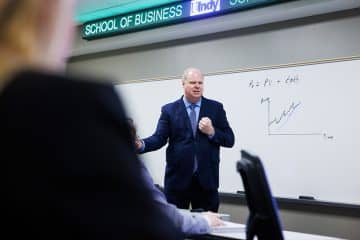How to Write a Statement of Purpose for Grad School
A statement of purpose is an essential part of every graduate school application, so how can you make sure that yours is a winner? We met with Sitafa Allen, MBA, PMP, for the answer. Allen, a Senior Digital Marketing Marketing Specialist at FedEx Services, earned her bachelor’s degree in Marketing from Mississippi State University and her MBA from the University of Memphis. Her experience and insight will help us break down for you how to write a statement of purpose for graduate school.
A statement of purpose, sometimes referred to as a personal statement, is a brief explanation of you, your experience, and your interest in the program. Ultimately, the admissions committee is looking for the answers to three broad questions:
Why you?
There are plenty of qualified candidates with nearly identical test scores and similar work experience. So what makes you the better candidate? When asked about what made her stand out among the other candidates, Alllen answered that not only is she “unique just by being [herself], but [her] experiences are unique.” Allen made sure to include the special experiences she had that were relevant to the program, providing her insight in a way that expanded upon her basic résumé.
Why this program?
The committee’s main objective is to select candidates who are not only qualified, but especially well suited for the program. Take the time to reflect on the program you’re applying to and its specific attributes. Articulate why your personality, experience, and goals align with the mission of the school. Make sure to highlight specific professors or course experiences that draw you in. Doing so will demonstrate to the committee that your interest is sincere and unique to their program. Allen’s application emphasized how interested she was in the experiential component of the University of Memphis’ MBA program. And it lived up to its promise! Once she was a student at U of M, she secured a place in the FedEx Scholars Program, which ultimately led to her current position as Senior Digital Marketing Specialist.
Why now?
Briefly explain why and how you’re ready for the demands of graduate school at this time in your life. This is also an appropriate time to explain any inconsistencies in performance or gaps in your résumé.
Read the instructions… and between the lines.
Each institution might have different requirements for what to include in a statement of purpose, so it’s important that you follow the appropriate protocol. Beyond formatting rules and submission guidelines, you should pay attention to the subtext of what is being asked of you. For example, Allen intuitively emphasized her professional experience in her statement after reading the program description, thus distinguishing herself as the ideal candidate. If it’s hard to infer what the committee is looking for, take time to do some detective work. Look up recent graduates of the program, dig into the institution’s corporate partnerships, or simply go straight to the source.
Take a page out of Allen’s playbook and contact the school directly; while preparing her application, she called an advisor at the University of Memphis and asked what the ideal candidate looked like. From there, she was able to tailor her statement, highlight her relevant experience, and communicate the attributes she shared with the ideal. Not every school will be as open and communicative, but it doesn’t hurt to try. The worst they can say is no, and regardless, you’ll have demonstrated your sincere interest.
Create a narrative.
The admissions committee wants to learn about what makes you unique and how your individuality will benefit the program. Communicating your experiences, both personal and professional, is done best by telling a compelling story. You don’t have to be a creative writer to add some context to your accomplishments. Avoid flowery, verbose prose and recount your experience concisely. In Allen’s case, she created a narrative of her marketing internship with the Mississippi State University Athletics Department. Rather than just listing her various duties, she wrote about her specific projects and what she gained from each experience.
Stay focused.
Writing a statement of purpose can be an intimidating task. How do you articulate all the motivation, passion, and years of experience you have in one letter? Although you might be tempted to recount the ins and outs of your career, it’s better to be focused and concise in what you reveal. It is important to articulate your goals and interests clearly as they pertain to the program you’re applying to.
Allen’s strategy was to discuss the professional experience she had in undergrad and how it was relevant to the program she was applying to at the University of Memphis. She recalled her internship with Mississippi State’s Athletics Marketing Department to emphasize the hard and soft skills she learned and how she would apply them to the MBA program at U of M. This is a perfect example of Allen’s ability to stay focused, as she efficiently tied her past experience to her abilities and merit for the future program.
Avoid clichés.
Every storyteller has to make a conscious effort to avoid clichés. It’s natural to want to use them; they’re clichés for a reason right? But in a statement of purpose, you’d be wise to avoid them altogether. Admissions committees read hundreds of purpose statements, and many of them probably included a phrase that went a little something like this: “Ever since I was a child, I knew I wanted to be a doctor.” As true as that statement might be, it is still overused. There are other ways to communicate how long you’ve been passionate about your career choice. Instead, write about a key moment in your personal or professional life that was instrumental in your career decision. It allows you to bypass the clichés with a story that’s specific to you.
Revise, revise, revise.
Regardless of your discipline, you’ll be doing plenty of writing, so make sure the committee gets a good first impression. Your statement of purpose should be grammatically flawless. Get as many eyes on it as you can before you submit. Further, take some time to review your tone. A pitfall that many academics fall in is a tendency to use too much jargon or come across as condescending. Of course, with some programs, there will be a greater need for technical language, but be judicious. Have someone outside your field of study read your statement to check for industry-heavy language or a patronizing tone.
Writing a statement of purpose can be an intimidating task, but it also serves as a wonderful opportunity to get personal with the admissions committee. With the proper planning and focus, you’ll write a statement of purpose that will show an admissions committee that you’re the clear choice. Abound: MBA is here for you every step of the way. We connect grad students to the right institution by focusing on what matters most. It’s not about how rich or famous a school is; it’s about finding the best place to pursue your goals and succeed. Check out the schools we trust to find your match.





